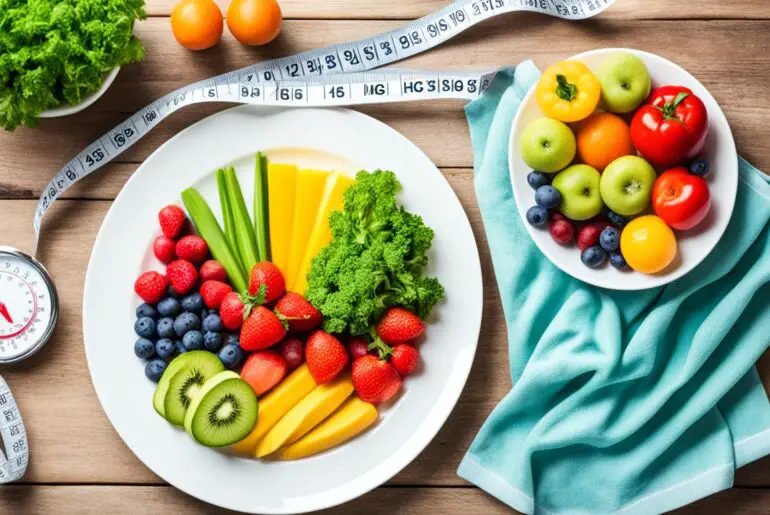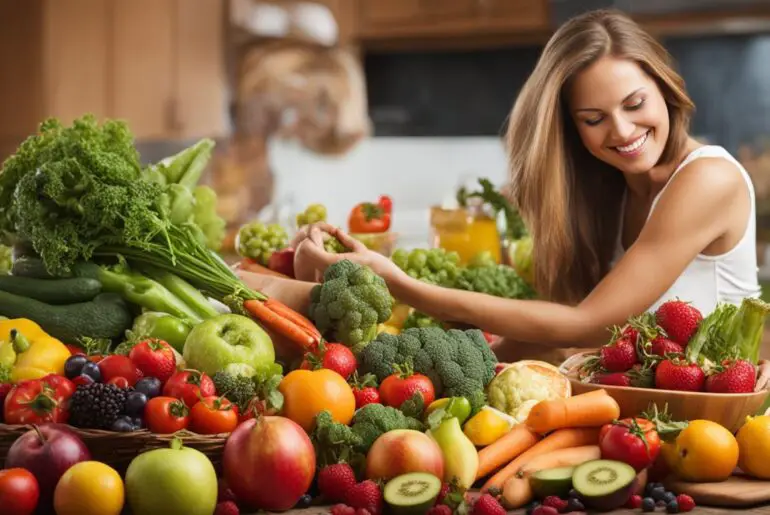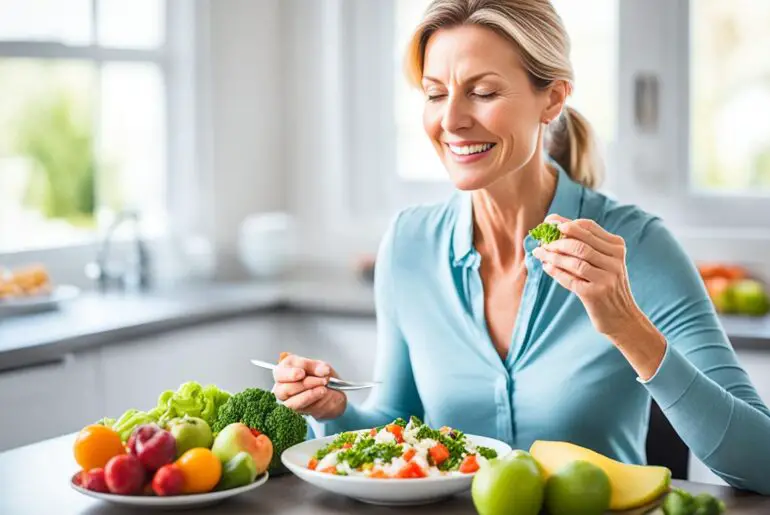Are you struggling to manage hunger while on the HCG diet? You’re not alone. Many individuals encounter hunger pangs during the early stages of the HCG protocol as their bodies adjust to the calorie-restricted diet. But fear not! There are effective strategies to cope with hunger and stay on track with your weight loss goals.
Key Takeaways:
- Drinking plenty of water can help suppress appetite on the HCG diet.
- Coffee and green tea can act as natural appetite suppressants.
- Spacing out meals and ensuring adequate protein intake can minimize hunger.
- Certain “free vegetables” can be incorporated to alleviate hunger pangs.
- Adjusting the hCG dosage may be necessary for optimal hunger control.
The Role of Water in Suppressing Appetite on the HCG Diet
When it comes to managing hunger on the HCG Diet, the importance of water cannot be overstated. Drinking an adequate amount of water, between 2-4 liters daily, can help suppress appetite and support weight loss efforts.
Dehydration can often be mistaken for hunger, leading to increased cravings and a higher risk of cheating on the diet. By staying hydrated, you can reduce the likelihood of mistaking thirst for hunger and maintain better control over your appetite.
Drinking water is especially important during the HCG Diet because it helps flush out toxins and waste from the body, accelerates metabolism, and aids in the breakdown of fat cells. Additionally, staying hydrated can help prevent constipation, a common side effect of the HCG Diet.
Not only does water play a vital role in appetite suppression, but it also supports overall health and well-being. Proper hydration helps regulate body temperature, improves digestion, promotes joint health, and keeps the skin hydrated and glowing.
Alongside water, other hydration options on the HCG Diet include tea and sparkling water without additives. Unsweetened herbal teas, such as chamomile or peppermint, can provide a refreshing change while helping to control your appetite. Sparkling water can add a bit of fizz to your fluids without derailing your progress.
| Benefits | Description |
|---|---|
| Appetite suppression | Drinking water can help curb hunger and reduce cravings. |
| Hydration | Water keeps your body hydrated and supports overall health. |
| Detoxification | Water flushes out toxins and waste from the body. |
| Metabolism boost | Adequate water intake accelerates metabolism and aids in fat breakdown. |
| Constipation prevention | Staying hydrated helps prevent constipation, a common side effect of the HCG Diet. |
| Overall health | Proper hydration supports various bodily functions, including digestion and joint health. |
Remember to listen to your body’s signals and drink water throughout the day, even if you don’t feel particularly thirsty. Carry a water bottle with you as a reminder to hydrate regularly. By prioritizing hydration, you can effectively suppress your appetite, stay on track with the HCG Diet, and reap the numerous health benefits that come with proper water intake.
Coffee as an Appetite Suppressant on the HCG Diet
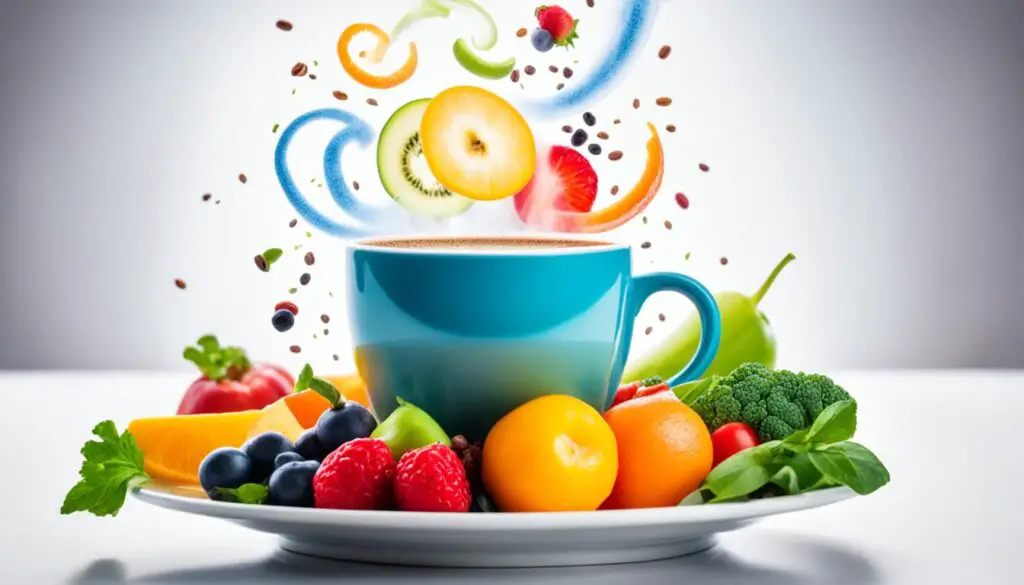
When it comes to managing hunger on the HCG Diet, coffee can be a valuable ally. The presence of caffeine in coffee makes it an effective appetite suppressant, particularly when consumed black. Caffeine stimulates the central nervous system, reducing feelings of hunger and increasing alertness.
However, it’s important to note that not everyone reacts to caffeine in the same way. Some individuals may be sensitive to its effects, experiencing jitters, anxiety, or sleep disturbances. In such cases, it may be necessary to avoid or limit coffee consumption while on the HCG Diet.
To ensure the best results, it’s always a good idea to listen to your body and monitor your individual response to coffee. If you find that coffee negatively impacts your hunger control or overall well-being, it’s recommended to explore alternative appetite suppressants or consult with a healthcare professional.
The Benefits of Drinking Coffee on the HCG Diet:
- Acts as an appetite suppressant due to the presence of caffeine
- Increases alertness and energy levels
- Potential to aid in weight loss
- Can be a satisfying and enjoyable addition to your daily routine
Remember, moderation is key when incorporating coffee into your HCG Diet plan. Opt for black coffee without any added sweeteners or high-calorie creamers to keep the calorie count low. Additionally, be mindful of your overall caffeine intake and adjust accordingly to optimize hunger control and overall well-being.
| Coffee as an Appetite Suppressant on the HCG Diet | |
|---|---|
| Benefits | Considerations |
| Acts as an appetite suppressant | May cause jitteriness, anxiety, or sleep disturbances in sensitive individuals |
| Increases alertness and energy levels | Individual response varies, monitor your own tolerance |
| Potential to aid in weight loss | May need to limit intake if it negatively impacts hunger control |
| Can be a satisfying and enjoyable addition to your daily routine | Consult with a healthcare professional if you have concerns |
Green Tea’s Effects on Hunger on the HCG Diet
Green tea, a popular beverage known for its numerous health benefits, can also play a role in managing hunger on the HCG Diet. Studies have shown that green tea possesses appetite-suppressing properties, making it a valuable tool for individuals looking to control their hunger levels while on the diet.
One of the ways in which green tea helps suppress appetite is by inhibiting the breakdown of dopamine and norepinephrine, neurotransmitters that play a role in regulating hunger and satiety. By preventing the breakdown of these neurotransmitters, green tea can help decrease appetite and reduce the urge to eat.
Green tea also contains a substance called cholecystokinin (CCK), which is released during digestion. CCK is known for its ability to reduce appetite by signaling fullness and satisfaction to the brain. By increasing the release of CCK, green tea can help individuals feel more satisfied and prevent overeating.
Furthermore, green tea contains thermogenic compounds such as catechins and caffeine, which have been shown to enhance metabolism and promote fat burning. By increasing thermogenesis, green tea can aid in the process of weight loss, potentially contributing to reduced hunger on the HCG Diet.
When incorporating green tea into your HCG Diet regimen, it is important to opt for unsweetened varieties to avoid adding unnecessary calories or sugars to your diet. Hot or cold, green tea can be enjoyed throughout the day as a refreshing and satisfying beverage.
“Green tea’s appetite-suppressing effects make it a valuable addition to the HCG Diet. By inhibiting the breakdown of key neurotransmitters and increasing the release of CCK, it can help individuals manage hunger cravings and stay on track with their diet goals.”
In addition to its appetite-suppressing properties, green tea is packed with antioxidants that support overall health and well-being. Incorporating green tea into your HCG Diet routine can provide a range of benefits beyond hunger management.
It’s important to note that while green tea can be a helpful tool in managing hunger, it is not a magic solution on its own. Implementing a well-rounded approach that includes other strategies such as adequate hydration, spacing out meals, and consuming enough protein is key to successfully coping with hunger on the HCG Diet.
Spacing Out Meals on the HCG Diet
Finding the rhythm of meal times that works best for each individual is important on the HCG Diet.
While some patients do better with eating one large meal, others may require more frequent meals. By spacing out meals, it may be possible to minimize hunger between meals.
Spacing out meals on the HCG Diet can help stabilize blood sugar levels and prevent drastic fluctuations in appetite. Eating at regular intervals throughout the day can also provide a consistent flow of energy and nutrients, supporting overall well-being.
When planning meal spacing on the HCG Diet, consider factors such as personal preference, lifestyle, and individual hunger patterns. Some individuals may find it beneficial to eat three evenly spaced meals, while others may prefer to have smaller meals or snacks multiple times throughout the day.
Implementing meal spacing strategies can involve creating a schedule and sticking to it. This can help train the body to expect nourishment at specific times, reducing the likelihood of experiencing intense hunger between meals.
It is important to listen to your body and adjust meal spacing accordingly. If you find yourself feeling famished before the next scheduled meal, consider adding a small, healthy snack to bridge the gap. Experimenting with different meal frequencies and sizes can help determine the optimal approach for managing hunger on the HCG Diet.
Remember that while spacing out meals can provide hunger management benefits, it is still crucial to ensure you are consuming the recommended amount of protein and other nutrients throughout the day. Prioritize a well-rounded, balanced diet that meets your specific needs.
If you’re uncertain about the best meal spacing strategy for you, consult with a healthcare professional or a qualified HCG Diet specialist who can provide personalized guidance based on your unique circumstances.
The Importance of Protein on the HCG Diet
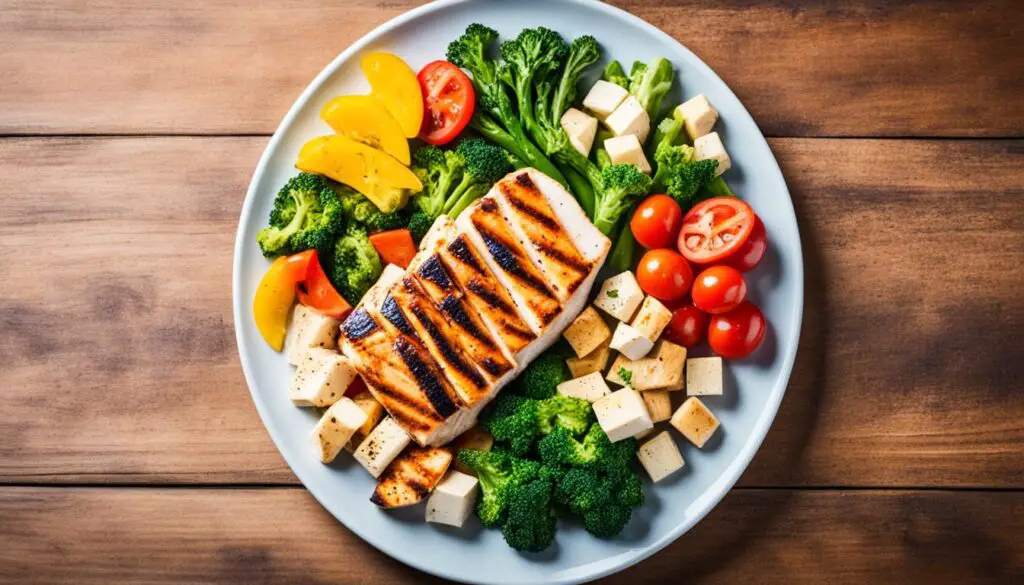
When following the HCG Diet, adequate protein intake plays a crucial role in hunger control and overall success. It is recommended to consume 3.5-4 ounces of protein per meal to support your body’s nutritional needs and minimize feelings of hunger between meals.
Lowering protein intake can result in increased hunger, making it more challenging to stick to the diet. Protein is a macronutrient that takes longer to digest compared to carbohydrates, helping to keep you feeling fuller for longer periods. Additionally, protein is essential for muscle maintenance and repair, which is especially important during weight loss.
To ensure you meet your recommended protein intake, consider incorporating protein-rich foods into your HCG Diet meals. Some excellent sources of lean protein include:
- Skinless chicken breast
- Lean cuts of beef
- White fish
- Egg whites
- Low-fat Greek yogurt
- Tofu
By including these protein options in your meals, you can help regulate your hunger levels and maintain a more satisfying eating experience on the HCG Diet.
“Protein is an essential component of a balanced HCG Diet. It not only helps manage hunger but also supports muscle health during weight loss.” – Dr. Sarah Roberts, HCG Diet Expert
Staying consistent with your recommended protein intake is key to maximizing the benefits of the HCG Diet. Below is a comprehensive table outlining the protein content of various foods to help you plan your meals effectively:
| Food | Protein Content (per 3.5 oz serving) |
|---|---|
| Skinless Chicken Breast | 30 grams |
| Lean Cuts of Beef | 26 grams |
| White Fish | 26 grams |
| Egg Whites | 11 grams |
| Low-Fat Greek Yogurt | 10 grams |
| Tofu | 8 grams |
By incorporating these protein-rich options into your HCG Diet meals, you’ll not only support your hunger control efforts but also promote optimal health and muscle maintenance while losing weight.
Utilizing “Free Vegetables” on the HCG Diet
When following the HCG Diet, finding low-calorie options that can help manage hunger is essential. One way to incorporate satisfying and fiber-rich foods into your HCG protocol is by utilizing “free vegetables.” These vegetables are not only low in calories but also provide the necessary nutrients and satiety to support your weight loss journey.
Some popular examples of “free vegetables” on the HCG Diet include:
- Celery
- Cucumber
- Radishes
- Lettuce
- Cabbage
These vegetables are not only great choices because of their low-calorie content, but they also boast high fiber levels. Fiber-rich foods are known to contribute to feelings of fullness and help control hunger. By incorporating these “free vegetables” into your meals, you can enjoy a greater sense of satisfaction while managing hunger on the HCG Drops.
For a clear understanding of the nutritional value and calorie content of these “free vegetables,” refer to the table below:
| Vegetable | Serving Size | Calories | Fiber |
|---|---|---|---|
| Celery | 1 stalk (40g) | 6 | 1g |
| Cucumber | 1 cup (104g) | 16 | 0.5g |
| Radishes | 1 cup (116g) | 19 | 1.9g |
| Lettuce | 1 cup (56g) | 5 | 0.5g |
| Cabbage | 1 cup (70g) | 17 | 1.8g |
By incorporating these low-calorie and fiber-rich “free vegetables” into your HCG Diet, you can enjoy flavorful and nutritious meals while keeping hunger at bay. Remember to experiment with different combinations and cooking methods to keep your meals interesting and satisfying throughout your weight loss journey.
Adjusting the Dose of hCG for Hunger Management
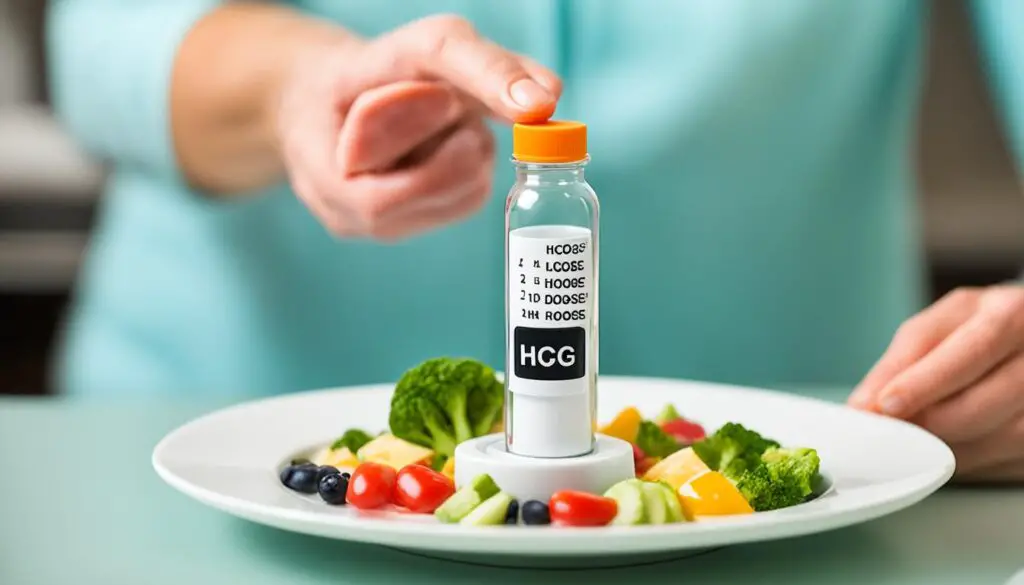
When it comes to hunger management on the HCG Diet, finding the right dose of hCG is key. The dose of hCG can greatly impact hunger levels, and making adjustments can help minimize those pangs of hunger that may arise during the diet.
Typically, the recommended dose of hCG for injections is between 125-175iu. However, it’s important to note that individual needs may vary. Men may require slightly higher doses than women. It is always best to consult with a healthcare professional familiar with the HCG Diet to determine the most appropriate dose for your specific needs.
When adjusting the hCG dose, it’s crucial to make tiny adjustments of 10-15iu at a time. These incremental changes can make a significant difference in hunger management without compromising the effectiveness of the HCG Diet.
It’s important to obtain real hCG injections or prescription drops from reputable sources to ensure optimal results. Using authentic hCG products will not only help manage hunger but also provide the necessary support for successful weight loss on the HCG Diet.
Expert Tip:
“Adjusting the dose of hCG is crucial for hunger management on the HCG Diet. By finding the right dose, patients can minimize hunger levels and stay on track with their weight loss goals.”
Factors That Influence Hunger on the HCG Diet
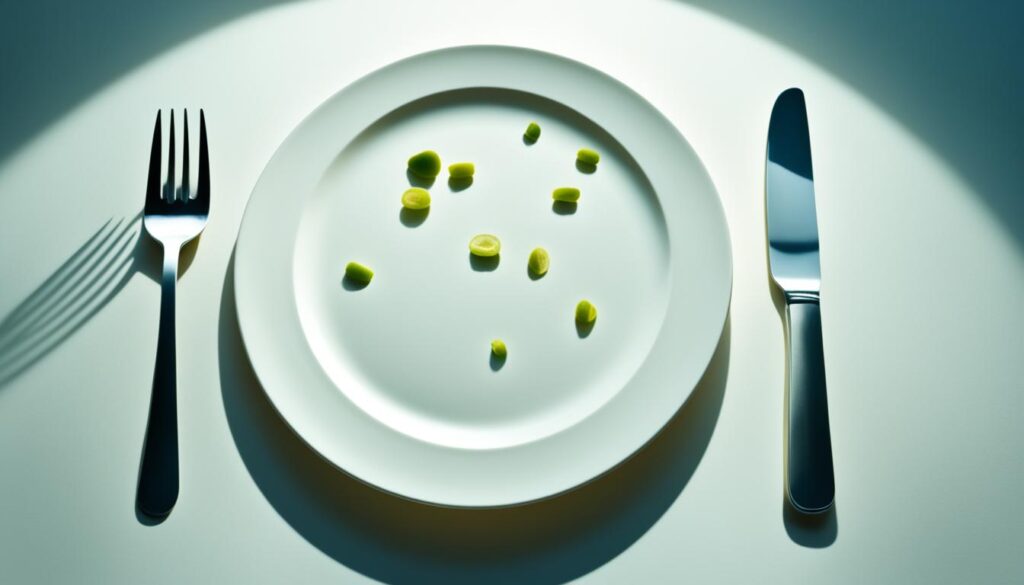
Aside from hCG dosage, there are several factors that can contribute to hunger on the HCG Diet. Understanding these factors can help individuals better manage their hunger levels and make necessary adjustments to their diet plan. Let’s explore some of the key reasons for hunger on the HCG diet:
1. Carb Withdrawal
When starting the HCG Diet, the body goes through a period of adjustment as it transitions from a carbohydrate-rich diet to a low-carb protocol. This carb withdrawal can lead to increased hunger as the body craves its usual source of energy. It’s important to be aware of this transition phase and be prepared to manage hunger during this time.
2. Loading Phase and Hunger
During the loading phase of the HCG Diet, individuals are encouraged to consume high-calorie and high-fat foods for a short period. This phase can sometimes lead to increased hunger once the low-calorie phase begins. The sudden shift from a high-calorie diet to a restricted calorie intake can trigger hunger pangs. However, it’s important to remember that this phase is temporary, and hunger levels usually subside once the body adjusts to the low-calorie phase.
3. Blood Sugar Issues
Individuals who experience blood sugar issues may find that their hunger levels fluctuate on the HCG Diet. Low blood sugar levels can trigger hunger and cravings. Some individuals may need to eat a small amount of food in the mornings to stabilize their blood sugar levels and prevent excessive hunger throughout the day.
To effectively cope with hunger on the HCG Diet, it’s crucial to listen to your body and make adjustments as needed. If you’re experiencing increased hunger, consider consulting with a healthcare professional or a certified HCG Diet coach to find personalized solutions.
Conclusion
Coping with hunger on the HCG Diet is essential for maintaining a successful diet and achieving your weight loss goals. By implementing effective hunger management strategies, you can navigate through the challenges of hunger while on the HCG protocol.
One key strategy is to stay hydrated. Drinking an adequate amount of water throughout the day can help suppress appetite and keep hunger at bay. Additionally, consuming appetite suppressants like coffee and green tea can further assist in managing hunger on the HCG Drops.
Spacing out your meals and ensuring an adequate intake of protein are also important hunger management techniques. By spreading your meals throughout the day and paying attention to your protein intake, you can minimize hunger and maintain satiety. Incorporating “free vegetables” into your meals, such as celery or lettuce, can provide fiber and help keep you feeling satisfied.
Finally, adjusting the hCG dosage may be necessary for optimal hunger control. Finding the right dose, with the guidance of a healthcare professional, can significantly impact your hunger levels while on the HCG Diet.
Overall, by implementing these hunger management strategies, you can maintain a successful HCG diet and cope effectively with hunger on the HCG protocol.
FAQ
How can I cope with hunger while on HCG drops?
There are several strategies you can implement to manage hunger on the HCG diet. These include drinking plenty of water, consuming coffee or green tea as appetite suppressants, spacing out meals, ensuring adequate protein intake, and incorporating “free vegetables” into your meals.
Does drinking water help suppress appetite on the HCG diet?
Yes, staying hydrated by drinking 2-4 liters of water daily can help suppress appetite on the HCG diet. Dehydration can lead to increased hunger and a higher risk of cheating. You can also consume tea and sparkling water without any additives for hydration.
Can coffee act as an appetite suppressant on the HCG diet?
When consumed black, coffee can act as an appetite suppressant on the HCG diet due to the presence of caffeine. However, if you are sensitive to caffeine, you may need to avoid this option.
What are the effects of green tea on hunger while on the HCG diet?
Green tea is a well-known appetite suppressant. It contains compounds that inhibit the breakdown of dopamine and norepinephrine, resulting in decreased appetite. Green tea also releases a substance called CCK, which reduces appetite. Additionally, the thermogenic compounds in green tea aid in fat burning.
Should I space out my meals on the HCG diet?
Yes, finding the rhythm of meal times that works best for you is important on the HCG diet. Some patients do better with eating one large meal, while others may require more frequent meals. By spacing out meals, you may be able to minimize hunger between meals.
How important is protein intake on the HCG diet for hunger control?
Consuming the recommended 3.5-4 ounces of protein per meal is crucial on the HCG diet. Lowering protein intake can increase feelings of hunger between meals. Ensuring adequate protein intake can help manage hunger on the diet.
What are “free vegetables” and how can they help with hunger on the HCG diet?
Certain vegetables, such as celery, cucumber, radishes, lettuce, and cabbage, are considered “free foods” on the HCG diet. These options provide fiber and can help individuals feel satisfied while managing hunger. Incorporating these free vegetables into meals can aid in coping with hunger on the HCG diet.
Can adjusting the dose of hCG help with hunger management on the HCG diet?
Yes, the dose of hCG can greatly impact hunger levels on the HCG diet. Finding the right dose, typically between 125-175iu for injections, can help minimize hunger. Men may require slightly higher doses. Tiny adjustments of 10-15iu at a time can make a big difference in hunger management. It is important to use real hCG injections or prescription drops obtained from reputable sources for optimal results.
What are some factors that can influence hunger on the HCG diet?
Aside from hCG dosage, other factors can contribute to hunger on the HCG diet. Initially, carb withdrawal and the loading phase can affect hunger levels. Blood sugar issues may require some individuals to eat something in the mornings. It is important to listen to the body and make adjustments as needed.
How can I effectively cope with hunger on the HCG drops?
Coping with hunger on the HCG diet is crucial for maintaining diet success. By following strategies such as staying hydrated, consuming appetite suppressants like coffee and green tea, spacing out meals, paying attention to protein intake, and incorporating “free vegetables,” individuals can effectively manage hunger while on the HCG drops. Adjusting the hCG dosage may also be necessary for optimal hunger control.


